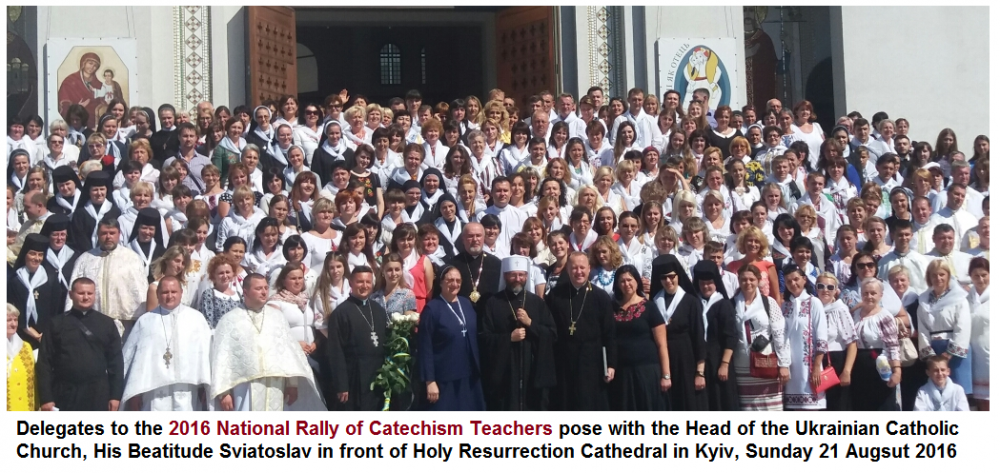BISHOP ENCOURAGES CATECHISM TEACHERS ON THE EVE OF A NEW YEAR
August 22, 2016

“I thank you on behalf of our Church and Bishops and on my own behalf, especially for the way that you dedicate your time, your talents and often even material means to fulfill, in the best possible way, this ministry which was entrusted to you by the Church. A Catechism teacher, above all, is a witness to mercy. In practical terms, this means that you must regularly and profoundly undergo the experience of God’s mercy in the Sacraments of Penance and reconciliation.”
Bishop Bohdan Dziurakh, CSsR, the Secretary of the Synod of Bishops of the Ukrainian Catholic Church, spoke Sunday at a national rally of Catechism teachers in Kyiv. The rally was held as the Catechism year will soon be starting in parishes throughout the Church in September. However, an additional theme was celebrated – namely, the 25 years since the Ukrainian Catholic Church was able to start functioning openly again in Ukraine after decades of Communist oppression during the Soviet Years.
The Bishop, using three speaking points, went on to explain that the Catechism teacher is also a teacher of mercy. The first point to underline the important of the concept of Mercy in the work of a Catechist was that, “In this context pragmatic catechesis assumes a particular importance that is not so much a quantity of particular knowledge that we must transmit to students, but the fundamental and concise proclamation of that which is most significant in our faith and upon which all Christian Faith depends. Because one may know by memory all the Commandments of God, but if the message of God’s love is not imprinted on the consciousness and heart of the believer from childhood, then all knowledge becomes useless, because “knowledge puffs up, but love builds up” (cf. 1Cor. 8:1)
The second ‘school’ of God’s mercy, the Bishop said, is found in the Holy Mysteries (the Sacraments): “Our task is to teach those within our Catechism program to approach the Holy Sacraments so that their reception of the Sacraments and their experience of the Sacraments corresponds to their age, state in life and life situation. In order that in every situation of their daily existence they would feel upon them the hand of God - that heals.” He was not at all suggesting that practical catechism could be dispensed with, but rather that it must be complimented by or succeeded by an aspect of liturgical and mystagogical catechesis. This is how a person can grow in the faith by an increasingly more in-depth revelation of the mystery of the presence of God in prayer, liturgical prayer in particular, and in the Holy Sacraments.
 Finally the third critical instance is when Catechism teachers can give to their students the important lesson of mercy via “a catechesis of charity” – in other words teaching by practical good deeds. “The Jubilee Year of Mercy gives us a unique opportunity to remind ourselves and those whom we catechise ways to proclaim the Gospel that are totally simple in their performance, yet wondrous in their effectiveness – the ‘seven corporal works of mercy’ and the ‘seven spiritual works of mercy’.” “The way of holiness for a Catechism teacher is interwoven with the Church’s Teaching and with the daily and faithful fulfilment of one’s tasks of learning the faith and passing it on!”
Finally the third critical instance is when Catechism teachers can give to their students the important lesson of mercy via “a catechesis of charity” – in other words teaching by practical good deeds. “The Jubilee Year of Mercy gives us a unique opportunity to remind ourselves and those whom we catechise ways to proclaim the Gospel that are totally simple in their performance, yet wondrous in their effectiveness – the ‘seven corporal works of mercy’ and the ‘seven spiritual works of mercy’.” “The way of holiness for a Catechism teacher is interwoven with the Church’s Teaching and with the daily and faithful fulfilment of one’s tasks of learning the faith and passing it on!”
Bishop Bohdan concluded his homily with a blessing of hope, “May God’s grace and the intercession of the Most Holy Mother of God and all the Saints and Righteous of Ukraine strengthen you on this journey!”